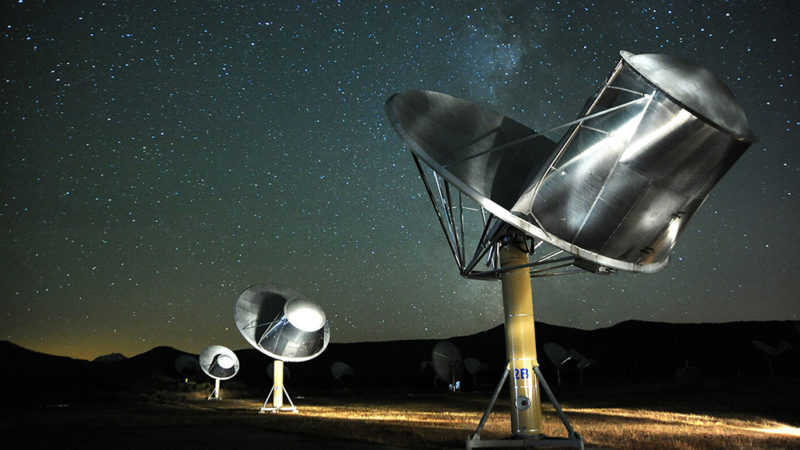Event 3 - Contact Watch Party (May 27th)
Last week I attended the watch party for the film Contact, which was a very interesting film that centered around the idea of contacting and communicating with extraterrestrial life. Although humans in the real world have yet to make real contact with ‘aliens’ (unlike the main character of Contact, Dr. Ellie Arroway) the film puts forth many interesting debates and problems that humans have to think about when it comes to contacting life beyond Earth.
Satellites Sending Messages to Possible Extraterrestial Life into Deep Space (from Science News)
One of the main issues that Contact deals with when it comes to communicating with Aliens is over whether humans should even spend resources making attempts to communicate with extraterrestrial life in the first place. Before successfully making contact with the aliens, Ellie faced many setbacks in the forms of relocation and budget cuts to her fieldwork, with many of her supervisors and fund providers questioning if the resources being spent to listen for signals from aliens were worth it. This is a question that many researchers interested in life in deep space face in the real world as well. Over the past 25 years, since the shut down of the SETI (Search for Extraterrestrial Life) program, private companies have headed most of Earth’s search for aliens, but that may change soon. As of 2018, a bill was proposed to congress that would provide 10 million dollars towards a renewed NASA program aimed at communicating with life beyond Earth. This would be a huge step forward in the search for extraterrestrial life, yet experts still believe it does not mean anything will happen soon, which poses the same question that Ellie faced herself. Although the chances are slim, I think it is put best by Jill Tarter, former director of the SETI Institute, who said on the proposed funding that “the probability of success is difficult to estimate; but if we never search, the chance of success is zero.”
The Famous SETI Phoenix Project, Which Listened for Radio Signals from Other Planets (from SETI Institute)
Another debate covered by the movie is how humans should go about communicating with aliens if contact is made. In Contact, Ellie (after unsuccessful attempts with another candidate) is sent to communicate with the aliens and discovers that there are thousands of other species out in space and that many communicate with each other just like she is doing herself. If we ever make contact with aliens, it is actually presumed by experts that like in Ellie's case, the life forms will be far more advanced than we are. Experts at NASA say that to make contact with other life, the extraterrestrial beings would have to have more advanced technology to communicate with us because the signals that our current technology can send out have little chance of reaching far enough for aliens to ‘hear’ (Carter). Presuming that the aliens we contact will be more advanced than us, how we talk to them is up to question, as a life form with the capability to contact us may also have the capability to dominate Earth and humans easily. Yet, if beings with such powers exist out there, another question that arises is why haven’t they done so already?
Jill Tarter (whom Contact was based upon) Speaking at Berkeley on Contacting Aliens (from the Daily Californian)
Although Contact is pretty far-fetched as far as science fiction movies go, it definitely deals with some crucial ethical and scientific questions that communication with extraterrestrial life holds. I thoroughly enjoyed watching the movie as it made me think about communication with aliens in many ways that I had not thought of before, as the media often likes to portray aliens in movies in a vicious manner more similar to Predator or A Quiet Place.
References:
Bryner, Jeanna. "Congress Wants to Spend $10 Million to Search for Aliens, and Texas is to Thank." Live Science, 10 May 2018. Web. <https://www.livescience.com/62529-congress-search-for-intelligent-aliens.html>
Carter, Jamie. "Our ‘First Contact’ With Aliens Will Be With A Superior Civilization, Say NASA Scientists As They Narrow The Hunt." Forbes, 23 Mar. 2021. Web. <https://www.forbes.com/sites/jamiecartereurope/2021/03/23/our-first-contact-with-aliens-will-be-with-a-superior-civilization-say-nasa-scientists-as-they-narrow-the-hunt/?sh=63b90b485c31>
Jett, Jennifer. "Why Are We All Talking About U.F.O.'s Right Now?" New York Times, 03 Jun. 2021. Web. <https://www.nytimes.com/2021/06/03/us/ufos-report.html>
Loeb, Avi. "What Should We Do if Extraterrestrials Show Up?" Scientific American, 15 Apr. 2021. Web. <https://www.scientificamerican.com/article/what-should-we-do-if-extraterrestrials-show-up/>
"Project Phoenix." SETI Institute. Web. <https://www.seti.org/seti-institute/project/details/project-phoenix>
Siegfried, Tom. "Self-Destructive Civilizations May Destroy Our Search for Alien Intelligence." Science News, 06 Jul 2020. Web. <https://www.sciencenews.org/article/seti-alien-intelligence-self-destructive-civilizations>
Stassinopoulos, Alexandra. "Jill Tarter Speaks About Search for Extraterrestrial Life at Berkeley Forum Event." The Daily Californian, 18 Sept. 2019. Web. <https://www.dailycal.org/2019/09/17/jill-tarter-speaks-about-search-for-extraterrestrial-life-at-berkeley-forum-event/>
"UFO Philosopher: Humans Not Ready to Make Contact with Aliens." Channel 8 News, Nexstar Media, 15 Apr. 2021. Web. <https://www.wfla.com/news/national/ufo-philosopher-humans-not-ready-to-make-contact-with-aliens/>



Comments
Post a Comment